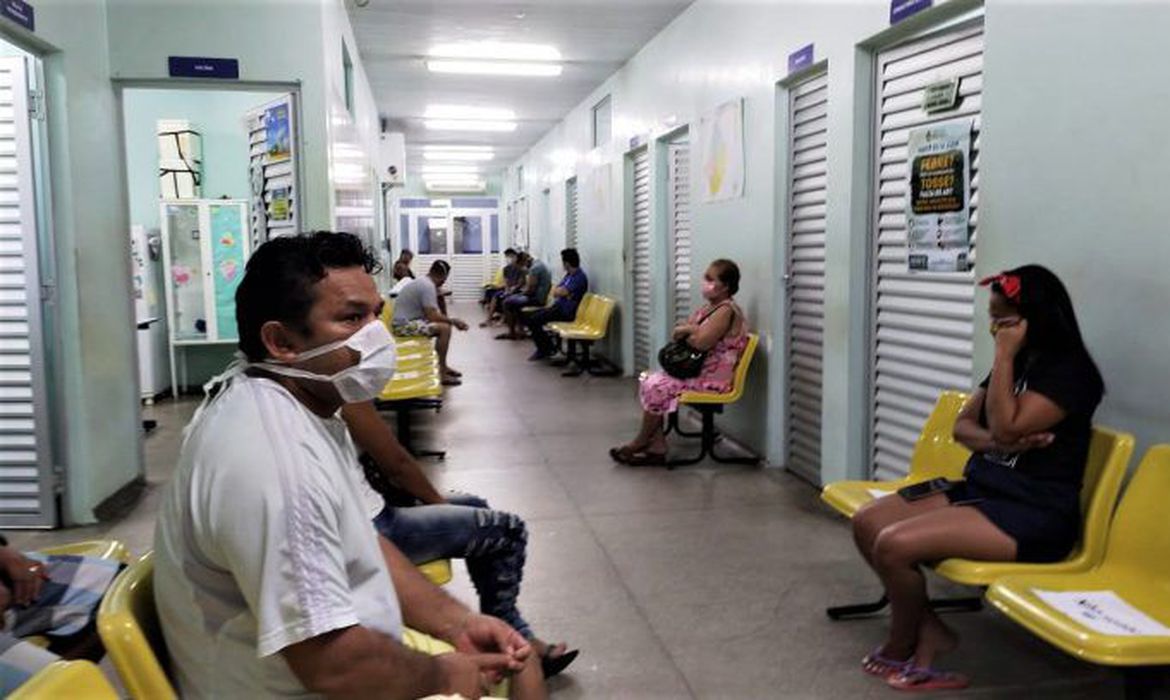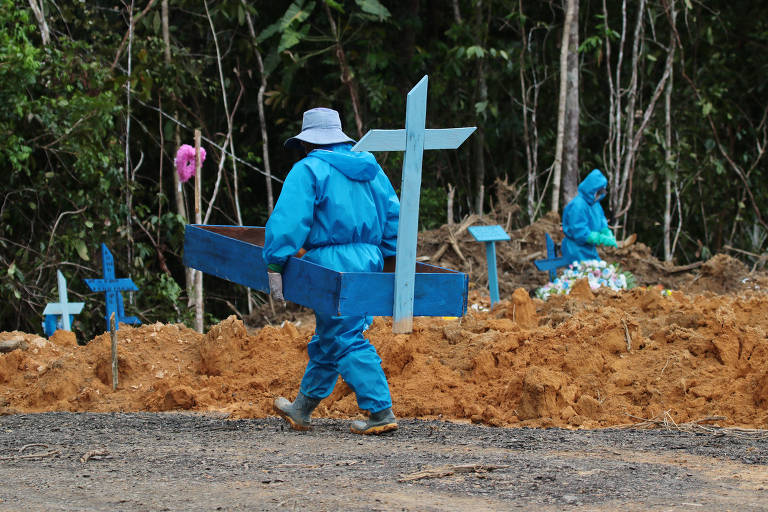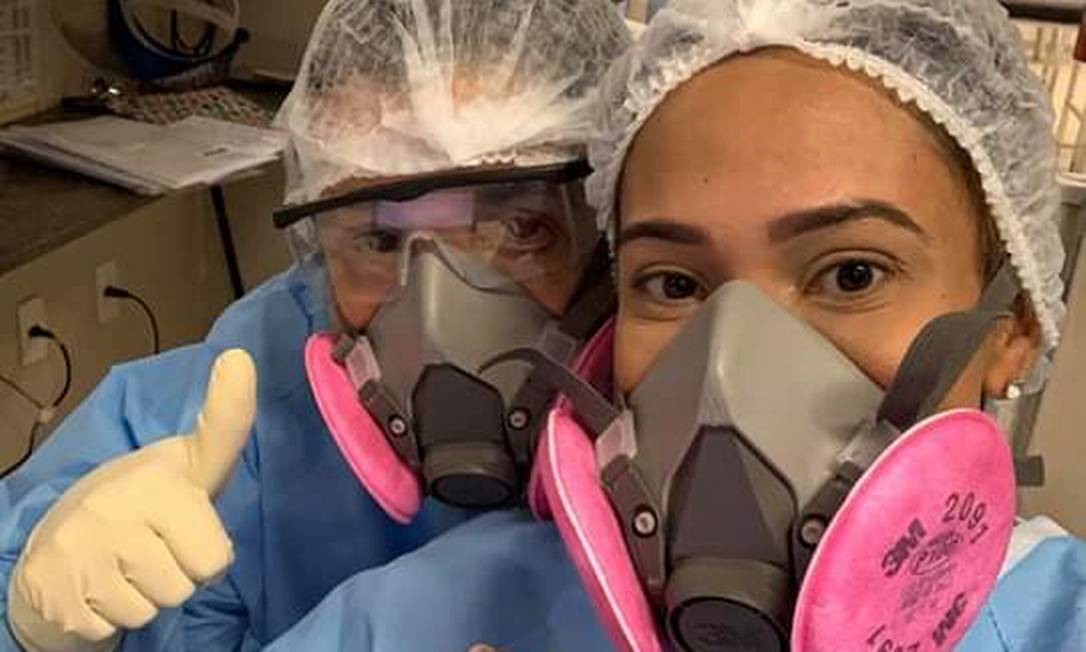RIO DE JANEIRO, BRAZIL – “Patients with covid feel very thirsty. There are times when they need a lot of water. And then you see the patients asking for water and… you can’t, you can’t, you’re intubating someone, checking on another more critical patient. And there’s no one to assist that patient”.
Doctor Uildéia Galvão works 12 hours a day, every day. Sometimes, 20 hours a day, to take care of patients who reach the 28 de Agosto Emergency Room, in Manaus. The capital of Amazonas is one of the most affected by the coronavirus crisis in Brazil and has been the stage for the saddest stories of the pandemic in the country. Overcrowding in hospitals, an avalanche of bodies in cemeteries, hundreds of dead who never made it to the hospital and died at home.
Galvão attends to the 120 beds in the PS Rose Room, where critically ill covid-19 patients are referred. A doctor for 25 years, she has been unable to accept this new ‘time of death’ brought on by the coronavirus: “It’s hard for you to see people die alone. All alone. Alone.” Yes, she repeats the “alone” five times as if she doesn’t believe the very words coming out of her mouth.
In her hospital, there is no time for a video call by cell phone at the farewell moment. In her hospital, there’s no time for anything. “There are patients going four days without a bath, without cleanliness, because you don’t have the human resources there to do that”.
The collapse of Manaus’ health system seemed to be happening at any point, but the coronavirus rushed things. Dr. Galvão says it’s true that many health professionals picked up the virus and were placed on leave, but the truth is that human resources were lacking a long time ago.
In the midst of the pandemic, health professionals in the Manaus emergency rooms had still not been paid their February wages. In the midst of the pandemic, Manaus’ health workers need to buy their own protective equipment.

In the midst of the pandemic, there are many days before the public health laboratory in Amazonas collects materials for covid-19 testing. And this is not a delay in releasing results. No material is collected to produce results at all. “And we’re only attending to truly critical patients,” says Uildeia.
Officially, the state totaled 476 covid-19 deaths by Friday, and 5,723 infections. But the footage on the news of crowded cemeteries and the crying on TV of desperate families makes it clear that underreporting there is massive. The data distortion seems truly blatant. Over the weeks, Brazil has seen the grim pictures of burials in mass graves in the city of Manaus until dawn. I ask Dr. Galvão if she saw the pictures.
“I don’t even know if it’s moving, I don’t know if it’s tragic. But it really reflects our daily lives. It’s been very difficult indeed”.
Two weeks ago, Mayor Arthur Vírgilio went on social media to say that the daily average of burials in the city has tripled. Now they have quadrupled. Last Sunday, there was a peak of 140 deaths. The daily average has been 100 burials. In previous years, the days with the highest death toll were no higher than 35 burials. However, the data released to the Ministry of Health reported only 17 deaths.
The Mayor also issued another alert: the high percentage of people who die at home with no medical care. On Monday, more than a third of the people died at home.
The perfect storm hit Manaus. It combined an already vulnerable health system, a pandemic that brought an avalanche of patients to hospitals, an aging population at or above 60 with a variety of diseases, susceptible to the coronavirus and a complete disregard for isolation, to top it all.
According to data from the start up In Loco, which has been monitoring the flow of mobile phones throughout the country since the start of social isolation in mid-March, the state of Amazonas recorded the lowest percentages of compliance with the #fiqueemcasa (#StayHome). During the week, it reached less than 50 percent.
But there is yet another ingredient: the state governor, Wilson Lima. The people do not seem to be very happy with the governor. On Monday, the state legislature passed a request for federal intervention in the health department of Amazonas.
The request has already been forwarded to the federal government. In addition, the Doctors’ Union submitted a motion for the governor’s impeachment to the Legislative Assembly. The request has been accepted.
In addition, the Federal Prosecutor’s Office and the State Prosecutor’s Office say that the governor is not transparent in his spending on the pandemic.
A claim has been lodged asking the governor to disclose how he has spent every penny he received from the federal government to fight the coronavirus. And the health professionals join in. The State government failed to answer the many questions raised by the story.

Since speaking with Dr. Galvão for the first time, she says some things have improved. The protection equipment began to be delivered, even if rationed. “But it’s actually good that they’re rationed so they won’t be lacking.”
More back-up beds were added, which helped to unburden the emergency rooms. And the state government has opened a direct line of communication with doctors, in addition to pledging to organize a schedule to update the 2020 salaries, so that these are not delayed any further.
While all this happens around her, Dr. Galvão, albeit subtly, displays her resentment with the State’s rulers. She talks about those who go to the media saying that people are dying because they lack care. This falls on the people in the front line, working four times as hard as they did and facing the population’s anger.
“The population has tremendous difficulty understanding that it is not the health professionals who are responsible for establishing a reasonable care structure so that the likelihood of success is the best. Do you understand? And we can’t demystify that.”
– What’s your fear?
On the other end of the phone, a second of silence and the answer:
– My fear is that this will take too long. It’s exhaustion. It’s very exhausting. It’s exhaustion, really.
– How many days have you been at this pace?
– (an even deeper sigh than the first). At this rate? Since March 20th… around there.
– It’s been 30 days.
– It’s… been 30 days.
We talked some more. She thinks the peak will be next week. And she expresses her hopelessness over the disregard for professionals who lack a leader who can come up with an action plan. She doesn’t even think there’s any time left. She suffers to find that families dump their elderly in the hospital. “I told my daughter that it’s not always just a health care problem. There is also a humanitarian crisis”.

– If you could reach out on a national network, what message would you send?
The doctor answers, unblinkingly:
– Stay home. Stay home as long as possible and necessary. Pay attention to your elderly, to your parents… We have to learn something from this. Today we see a polarization not only of politics, but of everything, of ideas, of feelings, either you are this or you are that. I think we have to rethink all that and see where we want to go with our country, with our politics. It is impossible that we won’t learn that we must be more humane, more gentle and more polite and to better choose the people who will define the future of our grandchildren, our great-grandchildren. We have what we have today, we’re going to have to learn to live with it by doing our best. But in the future, there must be a mechanism for change.
Source: El Pais

